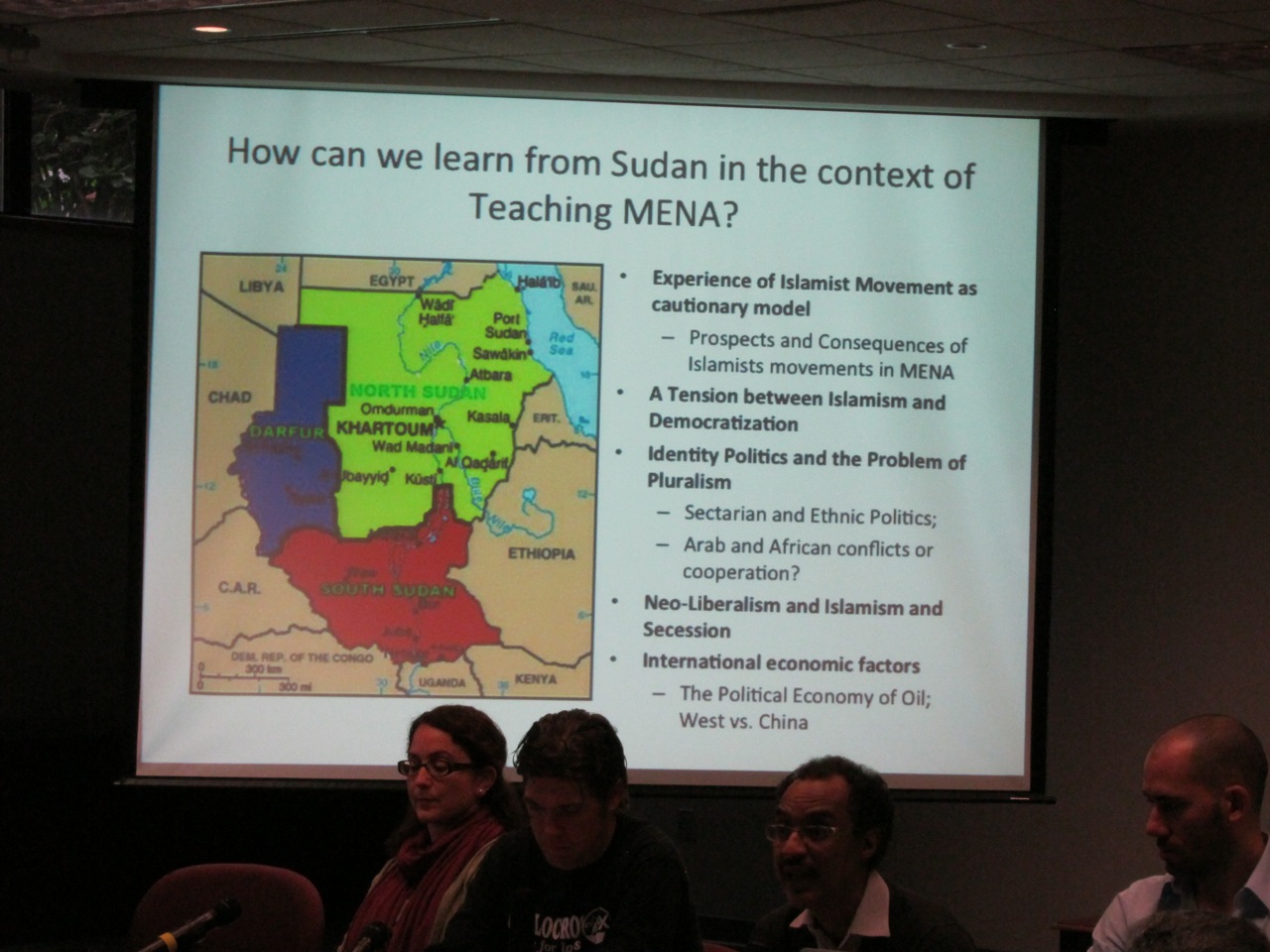On May 13 and May 14, more than forty scholars gathered as part of Jadaliyya`s first co-sponsored conference on "Teaching the Middle East After the Tunisian and Egyptian Revolutions." The conference announcement and description can be found here. Presenters` abstracts, panel summaries, and more are forthcoming on the Pedagogy Page.
FRIDAY, MAY 13
9:30am - 10:00am Introduction by Bassam Haddad and Cemil Aydin, and Welcome by Provost Peter Stearns
10:00am - 11:30pm Panel 1: Focus on Egypt
- Paul Amar How the Egyptian Revolution Teaches Political Sociology, Global Political Economy, Gender Studies, and Geopolitics
- Joel Beinin Workers and Egypt’s January 25th Revolution: Shifting the Discussion from Autocracy/Democracy to Political Economy and Equity
- Jason Brownlee How the January 25th Uprising Is Reshaping the Norms of Egyptian Domestic and Foreign Policy
- Peter Gran Thoughts Out of Season
- Paul Sedra Egyptian History Without “Egypt”? Privileging Pluralism in a Post-Revolution Pedagogy
Coffee break
11:45am – 1:15pm Panel 2: Knowledge Production and the Role of the Academic
- Rabab Abdulhadi Producing Knowledge for Justice? Gender and Sexuality Studies and the Consumption of Arabs and Muslims
- Tony Alessandrini Pedagogical Uprisings: Teaching to the Unconverted, or Against Multiculturalism’s Middle East
- Nadine Naber De-Orientalizing Pedagogy
- Stephen Sheehi The Social Relations of Islamophobia and the Role of the Academic
1:15pm - 2:30pm Lunch with discussion by Nir Rosen on Reporting in the Region: Producing “Knowledge” in Turbulent Times
2:30pm – 4:00pm Panel 3: Reframing Research Agendas and Analytical Narratives
- Cemil Aydin Rescuing History of Universalism and Modernity from Eurocentric Decline Paradigm
- James Gelvin Rethinking the Big Picture: Narrating Middle Eastern History in the Wake of the Arab Uprisings, 1944-Present
- Zachary Lockman Making Connections
- Pete Moore Back to Basics in Political Economy: Power and Inequality
- Hesham Sallam Challenges and Tradeoffs in Moving Beyond Dominant Approaches to the Study of the Comparative Politics of the Middle East
- Nadya Sbaiti Disoriented: Rethinking Middle East, Far West, and the Points in Between
Coffee break
4:15pm - 5:45pm Panel 4: Bringing the Middle East into the Fields of Law and Theory
- Shiva Balaghi Who’s Afraid of Iran? Neocons’ Enduring Influence on US Policy Analysis
- Asli Bali Comparative and International Law of the Middle East After the Uprisings: Re-assessing the State of the Arab State
- Noura Erakat Problematics of Teaching International Law in the Contemporary Middle East
- Lisa Hajjar Following the Torture Trail from Middle East Studies to American Studies Agnieszka Paczynska Teaching Middle East in Theory Courses
SATURDAY, MAY 14
10:00am - 11:30pm Panel 5: Peripheries and Exceptions
- Ziad Abu-Rish Regional Uprisings and Middle East Scholarship: Some Thoughts on What We Can Do Better
- Linda Herrera Youth and Citizenship in a Digital Age
- Toby Jones Democracy and its Limits in the Persian Gulf
- Khalid Medani The Emergence of North and South Sudan: Reinterpreting the Politics of the Nile Valley in the Context of the Arab Revolutionary Movements
- Maya Mikdashi Teaching the Middle East After the Revolutions: Critical Perspectives
11:45am - 1:15pm Panel 6: Teaching about Identity and Religion
- As’ad Abukhalil Teaching Arab Identity and Islam in Light of the Arab Uprisings
- Michaelle Browers Teaching Political Islam after “Post-Islamism” and the Arab Revolutions
- Sumaiya Hamdani Teaching Islam After the Revolution
- Laurie King Reconsidering Muddles in Middle East Models: the Utility of Ethnography in Pedagogy, Theory-Building, and Public Debate
- Hayrettin Yücesoy Revolutions and Teaching the Middle East and Islam
1:15pm - 2:30pm Lunch with discussion by Adel Iskandar on The Arab Media: Unlearning while Teaching on the Arab Media
2:30pm - 3:45pm Panel 7: Concluding Discussion I (Research Agendas)
4:00pm - 5:30pm Panel 8: Concluding Discussion II (Pedagogy and the Classroom)
SUNDAY, MAY 15
2:00pm Next Steps Organizational Meeting
Photo of a slide during Khalid Medani`s presentation:
